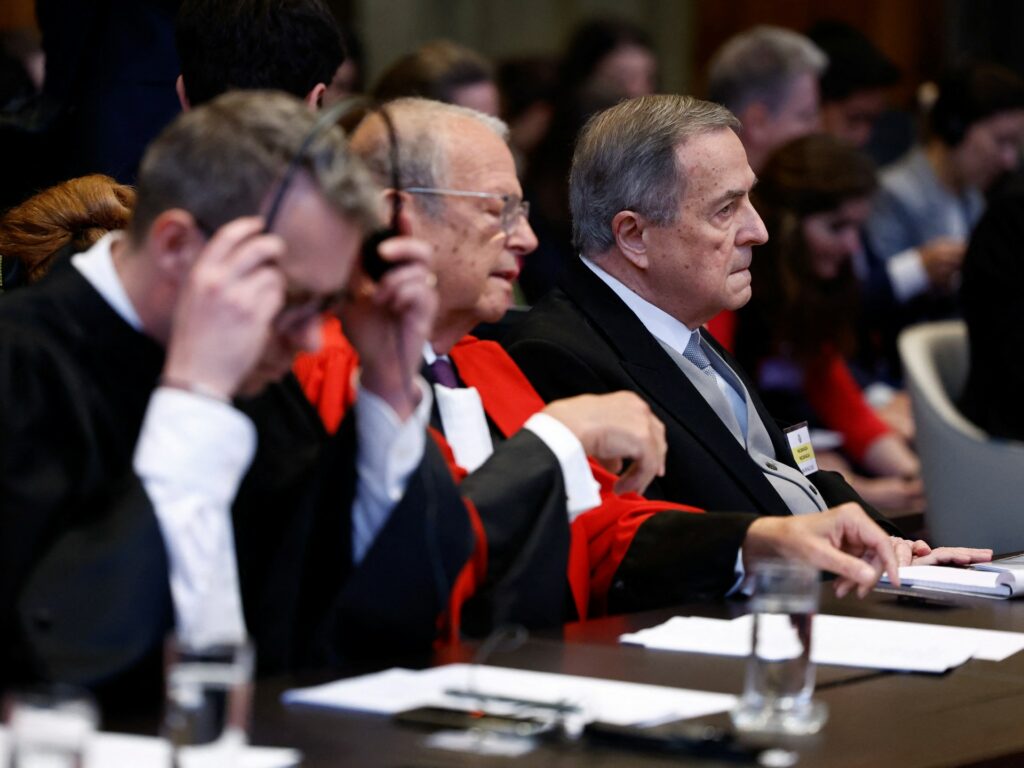Nicaragua Calls on International Court of Justice to End Germany’s Support for Israeli Actions in Gaza
Nicaragua has taken a bold step by bringing Germany to the International Court of Justice (ICJ) for allegedly facilitating what it calls “genocide” against Palestinians in Gaza. The Central American nation accused Germany of providing military aid to Israel while simultaneously stopping funding for the UN Palestinian refugee agency, UNRWA.
During the hearing at The Hague, Nicaraguan Ambassador Carlos Jose Arguello Gomez made a strong case, stating that serious violations of international humanitarian law, including genocide, were being openly committed in Palestine. He emphasized the need for other states to refrain from assisting the aggressor, in this case, Israel.
Nicaragua’s legal representative, Daniel Mueller, echoed these sentiments, condemning Germany’s actions as a “pathetic excuse” that contradicts the humanitarian aid it provides to Palestinians. He highlighted the hypocrisy of sending aid to help civilians while supplying the military equipment used to harm them.
In response, Germany’s legal representative, Tania von Uslar-Gleichen, dismissed Nicaragua’s claims as biased and expressed confidence in refuting the charges. She emphasized that Germany upholds its responsibilities and looks forward to presenting its case at the court.
Nicaragua’s submission to the ICJ argued that Germany’s support for Israel’s actions in Gaza violates the 1948 UN Genocide Convention. The Central American nation called for immediate measures to halt military aid to Israel and resume funding for UNRWA, citing the urgency of the situation and the lives at stake.
The ICJ, established to resolve disputes between nations, has become a crucial player in the ongoing conflict between Israel and Hamas. Nicaragua’s case adds to the growing international scrutiny of Israel’s actions in Gaza, with South Africa also accusing Israel of genocide in a separate case.
Despite the court’s binding rulings, enforcement mechanisms remain a challenge. However, Nicaragua’s call for emergency measures reflects the urgency of addressing the humanitarian crisis in Gaza and holding responsible parties accountable.
As the ICJ deliberates on Nicaragua’s request for provisional measures, the international community watches closely, hoping for a just resolution that upholds the principles of international law and protects the rights of civilians in conflict zones.
#Nicaragua #ICJ #Germanys #support #Israeli #genocide #Gaza
Long-Term Implications and Future Developments
Nicaragua’s charges against Germany for allegedly supporting Israel in Gaza have significant long-term implications for international relations. If the International Court of Justice (ICJ) rules in favor of Nicaragua, it could set a precedent for holding countries accountable for their actions in conflict zones.
Furthermore, this case sheds light on the complex dynamics of international alliances and the ethical responsibilities of nations when it comes to supporting military actions that may violate international law. If Germany is found guilty of facilitating genocide in Gaza, it could lead to diplomatic repercussions and calls for accountability from other countries.
In terms of future developments, the outcome of this case could impact Germany’s foreign policy decisions and its relationship with Israel. It may also influence how other countries approach similar situations in the future, prompting them to reevaluate their support for military actions that could be deemed as genocidal.
Actionable Advice
Based on these insights, it is important for countries to carefully consider the consequences of their actions when providing military support to allies in conflict zones. Governments should prioritize human rights and international humanitarian law in their decision-making processes, and ensure that their actions do not contribute to violence or atrocities against civilians.
Additionally, it is crucial for governments to be transparent and accountable for their actions, especially when allegations of genocide or other serious crimes are raised. International bodies like the ICJ play a crucial role in holding countries accountable and promoting justice in conflict situations.
Overall, the Nicaragua-Germany-Israel case highlights the importance of upholding international law and ethical standards in global affairs. It serves as a reminder that all countries have a responsibility to prevent human rights abuses and work towards peaceful resolutions in conflict zones.

